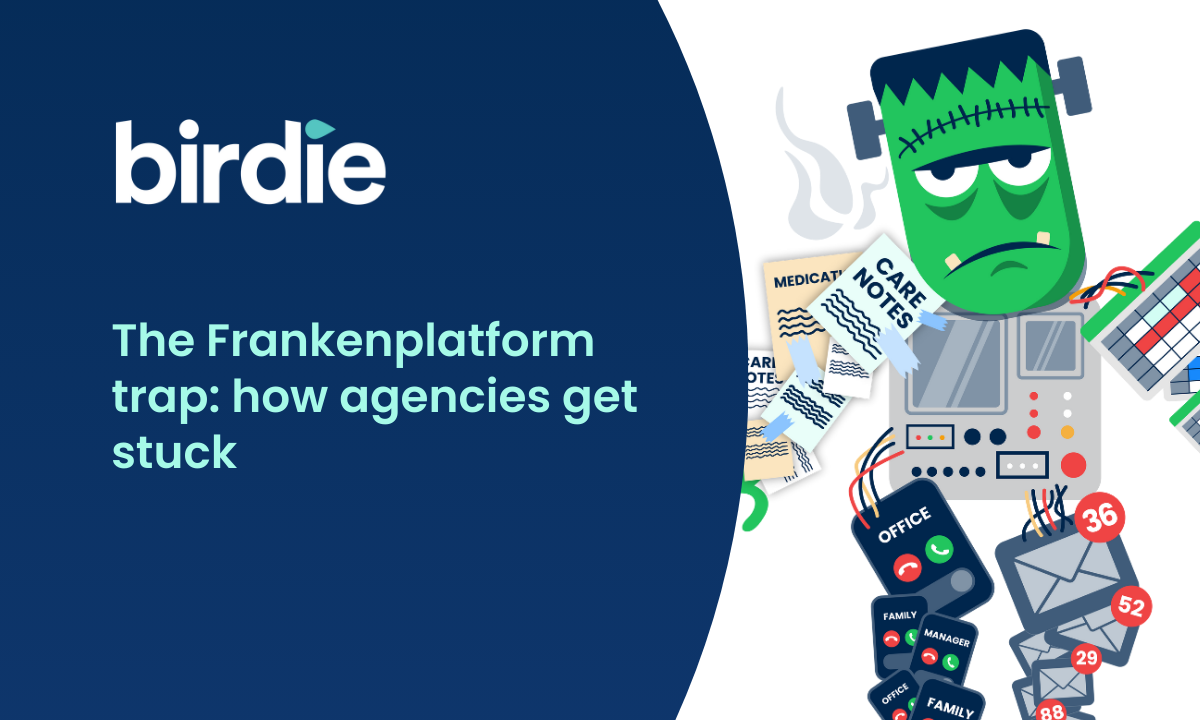Table of contents
On Thursday 26th July Birdie hosted our first roundtable discussion with industry leaders from the care sector as part of the 'Future of Homecare' series.
The Series has been created to bring together key industry leaders to discuss, challenge, and share insights across policy, provision and regulation. We believe that the best way to make progress in social care is to break through the silos and build a coalition of the willing to drive the changes that are needed.
The keynote address was given by Professor Paul Corrigan, CBE, Chair of Care City, on creating 'new value' in domiciliary care. Specifically, Paul spoke about how the current domiciliary care value proposition may evolve following the COVID-19 crisis. The event was attended by key figures in the care sector, from organisations including Sodexo, Westminster Homecare, Agincare and Medacs Healthcare amongst others.
Misaligned incentives mean opportunities in community care are missed because savings accrue to hospitals
Domiciliary care has a reputation for being focused on 'time and task'. However, expanding this proposition to focus on outcomes and maintaining independence for service users is becoming more and more important. If this can be achieved effectively, then an opportunity is created to delay the much greater cost of other forms of care.
"Keeping people out of hospital beds has been quite a significant discussion within the NHS for at least the last 14 years - at least since a white paper in 2006 called "Our health, our care, our say"
Professor Paul Corrigan
There is a huge opportunity for primary and community care professionals to create savings and improve outcomes for those receiving care. However, within the current NHS framework, most of those savings accrue to the hospitals, rather than to the primary and community care organisations whose work is required to achieve those outcomes.
"If a hospital has 50 fewer emergency beds filled, that money saved doesn't transfer into primary care or into community care. So the incentives for primary or community care to keep people out of hospital are moral rather than financial and that's one of the reasons that by and large it hasn't happened very much.
Professor Paul Corrigan
COVID-19 has exacerbated the issues - but also accelerated digitisation in health
During COVID-19, even greater importance has been placed on keeping people safe by caring for them within their own homes. However, the organisations working to achieve this would like to be fairly compensated for the hard work and additional costs incurred in delivering a vital service to their communities.
"People are now realising that we have got to change the way we deliver care. The statistics during this pandemic have shown us that the safest place for you to be cared for, is often your own home."
Beverley Sims-Manley, Managing Director of Medacs Healthcare
"We need to get people to realise that actually the vast majority of the care is done away from the public gaze in people's own homes. We need to professionalise it in terms of pay and conditions and the appreciation I think all our teams deserve. We shouldn't be having to knock on the door to say we can look after people with technology in the community to prevent readmission or to deliver better outcomes because that's we know what we can do."
Jonathan Bruce, CEO Sodexo Homecare
However, COVID-19 has accelerated the digitisation of the health sector overall, and the crisis has taught the NHS that much more can be achieved remotely in primary and secondary care than previously believed. At the moment, the area of most rapid change is patient to professional consultations, which are now taking place by phone or video conference, rather than face to face.
"Previously, (before the crisis hit) nine out of ten primary care consultations were done face to face. And now it's 3 out of 10. There has been a form of digital intervention here, which has transformed Primary Care in a way that hasn't happened for 70 years."
Professor Paul Corrigan
Beyond just consultations though, there are opportunities for diagnostics to take place remotely with the patient taking tests and sending in results to primary care. Such opportunities transform the value proposition of primary care, by incorporating self- and carer-led care into the value chain. However, again the key problem with this model is in the financial remuneration of the different organisations in the system.
"For these interventions - that have changed the nature of primary care very dramatically in a short period of time - to continue, the finances that primary care is based on are also going to have to change. There needs to be a different realisation of value in primary and community care as well as in social care, otherwise everything springs back to as it was."
Professor Paul Corrigan
There is an opportunity for remote testing by domiciliary care staff to create savings and improve outcomes
Most domiciliary care service users deal with a wide range of long term health conditions. These long term conditions cost about two thirds of NHS resources. Most are spent on exacerbations (emergency beds) when the long term conditions get out of control.
"If someone over 70 goes into a hospital bed for three weeks, they actually lose 50% of their muscles. This is a big issue and the idea of remote testing - that is, finding out whether those exacerbations are coming and doing something about it before people going to hospital - is crucial. For example, at Care City, we've been using Feebris to take not just blood pressure but actually to do a remote stethoscope and to be able to look at people's breathing."
Professor Paul Corrigan
For many years (2006 White Paper) the NHS has been trying to limit exacerbations with better out of hospital care. With the advance of technology, it is now possible for care workers to support service users with remote tests, where the results are shared directly with primary or secondary care. Not only would this create savings for the health system overall - including by better diagnosing deteriorations sooner - but it would also mean a better experience for those receiving care.
"Remote testing provides the possibility for all sectors outside of hospital to provide early warning, with direct and immediate real-time knowledge."
Professor Paul Corrigan
Integrated health and care systems create an opportunity for care organisations to capture some of the value they create
If unwell people are kept out of a hospital bed, nearly all the resources saved are in the hospital sector. Primary and community care have been trying to realise these savings for some time (and barely succeeding).
"It's been incredibly eye opening to see what we have been able to achieve with some of our focus on innovation and monitoring, but it's also been incredibly frustrating. It's not what we achieve doesn't save a huge amount for the local Authority - what it's actually doing is adding a heck of a Jot of value and taking cost out for CCGs - but it's very difficult to get people on board."
Rob Gready, Managing Director, Eclipse Homecare
There are 42 Integrated Care Systems (ICSs) which all have this as their main aim. They have varying degrees of integration and varying success. Within each ICS there are local Integrated Care Partnerships (ICPs) which deliver care in smaller localities. These will be trying to reengineer resource pathways to gather resources into prevention.
"Some of them are actually looking very genuinely at joint commissioning and moving money through domiciliary care, primary care and secondary care into a different financial flow. There are, across the country, hundreds of integrated care partnerships. The problem for social care is that most the people involved are in fact commissioners and not providers of care."
Professor Paul Corrigan
An alternative route of funding is Social Impact Bonds. These mechanisms may fund innovation, such as remote testing in domiciliary care, and seek to get saved resources out of hospitals. With either mechanism - Integrated Care Systems, or Social Impact Bonds - the key will be to demonstrate the savings that can be achieved for the health system, and find the right mechanism to capture those savings.
What impact will there be from giving the NHS the Social Care budget?
There have been many recent media and political conversations about the 'right' allocation of budgets. One proposition has been for the NHS to take on the Social Care budget and responsibilities, away from Local Authorities.
"I think I think it would be a big problem if the social care budget goes into the NHS. I don't think primary care has done well at being "in with the hospitals". In Northern Ireland there is a Department of Health and Social services, but actually if you are doing social services the Jack of integration is much the same. I think the problem, however, is how the money is configured."
Professor Paul Corrigan
Wrapping up
Birdie would like to extend a warm and heartfelt 'thank you' to Professor Paul Corrigan for a very enlightening discussion.
We would also like to thank all the Homecare Leaders who joined us for this first session in our Future of Homecare Series.
We'll be running these sessions regularly, so be sure to keep an eye on our social channels: Twitter, Facebook, Linkedin & Instagram.
Published date:
August 16, 2020
Author:
Abeed Mohamed
















.svg)